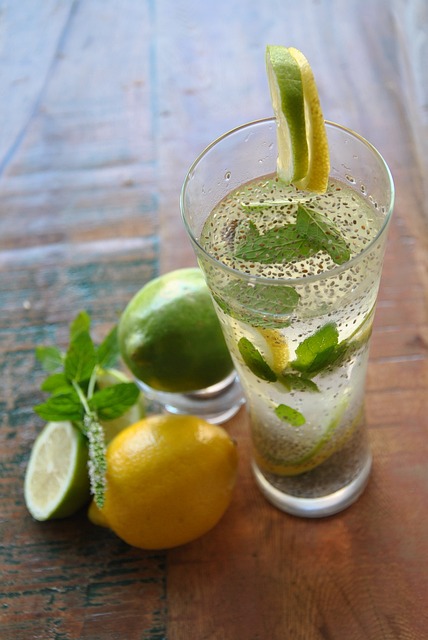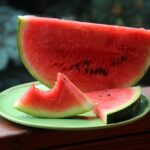It’s not too late to regain your hydration habits and start enjoying the advantages of being well-hydrated, even if you neglected them before or never consumed a lot of water to begin with.
According to Lisa Moskovitz, RDN, founder of the New York Nutrition Group in New York City, keeping your body hydrated is crucial since dehydration, even if it is minor, can have adverse effects on various bodily functions such as energy levels, digestion, and immunity. Therefore, staying hydrated is a worthwhile challenge to take up.
According to Moskovitz, being properly hydrated can enhance your body’s capacity to assimilate nutrients and maintain regularity in your digestive system. Mayo Clinic highlights the significance of sufficient water in promoting healthy gastrointestinal performance, as it facilitates the breakdown of food and prevention of hard stool.
Increasing your water intake can improve hydration of the outer layer of skin, known as the stratum corneum. This was evidenced in a review published in Skin Research and Technology in August 2018. Therefore, it is worthwhile to drink more if you are not consuming enough water.
It’s also worth keeping in mind the mental advantages: A 2015 report suggests that even minor dehydration can cause increased feelings of fatigue, reduced alertness, and a decrease in mood. Additionally, a review published in Nutrients in January 2019 indicated that consuming more water may assist obese adults in reducing body fat and losing weight.
According to data from the Centers for Disease Control and Prevention, adults in the United States consumed an average of approximately 44 ounces (oz) of water per day between 2015 and 2018, indicating that most adults do not drink enough water.
The recommended daily intake of water for adults in good health depends on various factors such as gender, body weight, and level of physical activity. However, generally, the National Academies of Sciences, Engineering, and Medicine suggests consuming a higher amount of water, approximately 91 oz for females and 125 oz for males. It is worth noting that some of this water requirement can be fulfilled by consuming foods and drinks with high water content.
According to Moskovitz, clients should consume the amount of water in ounces equivalent to half of their body weight in pounds. For instance, if an adult woman weighs 130 pounds, the recommended quantity of water intake would be 65 oz daily. A hydration calculator may also be used to receive personalized advice.
A portion of the water you consume will be obtained through the food you eat, and some will come from beverages such as coffee and tea, but the majority should be pure water. It is important to recognize that excessive consumption of water, although uncommon, can diminish the sodium levels in the body, which are vital electrolytes required for proper heart and muscle function, according to Moskovitz.
You have plenty of people joining you in your commitment to increase your water intake. Jennifer Ashton, MD, who serves as the chief medical correspondent for ABC News, also made this personal goal. Her experience is chronicled in her book The Self-Care Solution: A Year of Becoming Happier, Healthier, and Fitter — One Month at a Time.
To test if she could form a long-term habit and to observe any physical changes, she opted to consume water and seltzer without sweeteners exclusively for a month.
Dr. Ashton suggests that the most efficient way to hydrate one’s body is through water. She further explains that unlike water, soda, and sweetened beverages such as juice drinks, include additional sugar and calories that contribute minimal nutritious benefits.
1. Hydrate When You Wake Up and Before Meals
Moskovitz suggests prioritizing hydration by starting the day with two glasses of water, and having one glass of water before every meal and snack. Even if a water bottle is within reach, it’s easy to neglect taking sips throughout the day.
Combining food and water provides dual advantages: “In addition to its hydrating effects, water consumption can aid in slowing down your eating pace during meals. Beginning a meal with a completely empty stomach may lead to hurried eating and insufficient chewing, ultimately hindering proper digestion of food,” she explains.
Additionally, it could aid in reducing your food intake. According to a prior comprehensive analysis, dieters were found to have lost weight by increasing their water consumption. However, this habit did not result in weight reduction for individuals who were not attempting to lose weight. The reason why consuming more water may benefit dieters is because it potentially curbs the appetite, ultimately leading to reduced food intake during the respective meal.
However, the researchers stress that the results merely imply a correlation between hydration and shedding pounds. To eliminate the possibility of other elements contributing to weight loss, further investigations are necessary. “Due to the lack of high-quality research, there is little substantiation for this link,” they state.
2. Wrap Up Your Day With Another Bottle of Water
We just encouraged you to drink water once you wake up, but an additional strategy to consider is to bookend your day with another beverage. Meaning: Make sure to have a bottle of water within two hours of waking. Then, two hours before bed, finish another.
In a small study of healthy adults published in Nutrients in April 2020, those who drank 550 milliliters, which is approximately 18 ounces, of water each time were able to increase their daily water intake from 44 to 68 ounces. Additionally, participants experienced a decrease in blood pressure as the water helped their kidneys to function better, leading to the removal of excess sodium from their bodies.
Drinking more water not only helps regulate body temperature effectively but may also enhance circulation. It is advisable to schedule your water intake to finish around 2 hours before bedtime to avoid any inconvenience of having to wake up in the middle of the night for a bathroom break. Unlike scrolling through TikTok, this habit is sure to promote your overall well-being.
3. Eat Your Water by Following a Produce-Heavy Diet
According to Libby Mills, RDN, a spokesperson for the Academy of Nutrition and Dietetics based in Philadelphia, consuming fruits and vegetables can assist in fulfilling your daily water intake requirements due to their elevated water content.
She explains that cantaloupe, strawberries, watermelon, lettuce, cabbage, celery, spinach, and cooked squash contain roughly 90% water, while dairy items such as milk, yogurt, and cottage cheese are also rich in water content.
4. Drink Enough Water
Although staying hydrated isn’t solely dependent on water, water is still the foundation. Your top priority should be to consume half of your body weight in ounces of water or other hydrating liquids every day.
It is crucial to not only monitor the intake of water, but also the amount of fluids that are excreted from the body. In situations such as physical activity or exposure to high temperature, the loss of fluids is greater compared to times when one is sedentary, and hence, the individual needs to consume a larger quantity of water to compensate for the loss.
Replenishing fluids throughout the day is necessary as urination aids in natural detoxification and eliminates excess fluids from the body.
5. Eat More Fruits and Vegetables
The second step is to incorporate additional fruits and vegetables into your diet, as they are rich in nutrients and water content.
In the American Journal of Clinical Nutrition, there was a published study that examined the impact fruits and vegetables had on children’s hydration levels. The researchers assessed the dietary logs and urine samples of 442 school-aged kids and concluded that consistent consumption of fruits and vegetables led to enhanced hydration among the participants.
Included in the group of most hydrating foods are:
- Celery
- Watermelon
- Cucumber
- Kiwi
- Bell peppers
- Citrus fruit
- Carrots
- Pineapple
- Iceberg lettuce
- Radish
- Tomatoes
- Cauliflower
- Spinach
- Berries
- Broccoli
- Zucchini
- Avocado
- Grapes
6. Balance Electrolytes
In addition to their high water content, fruits and vegetables contain electrolytes such as potassium, magnesium, calcium, and sodium. Consuming high-quality sources of electrolytes is crucial for maintaining hydration.
Consuming fruits and vegetables can assist in preventing electrolyte imbalance, which promotes proper hydration.
The effects of a water and electrolyte solution, commonly known as electrolyte drinks, on hydration status, body temperature, and changes in drinking water during wildfire suppression were compared by the University of Montana. Sixteen firefighters were involved in the study, with eight drinking the plain water and eight drinking the water/electrolyte additive mixture.
The researchers discovered that the addition of electrolytes to regular water resulted in a reduction of total fluid intake. They concluded that incorporating electrolytes into water can lower the amount of fluid that needs to be consumed and transported during prolonged physical activity. This may help decrease the burden of excessive weight and potentially alleviate fatigue during extended exercise.
7. Consume Sea Salt
It is recommended to use all-natural sea salt, such as Celtic sea salt or Himalayan salt, and add a small amount to your food. Sea salt is advantageous for maintaining hydration levels, as water consumption requires sodium and potassium.
The sodium present in sea salt not only alkalizes the body but also helps to regulate the water and potassium levels, and studies suggest that hydration is improved by the combination of sodium and potassium.
8. Exercise
Although it may appear contradictory to exercise for hydration, scientific studies indicate that engaging in physical activities boosts blood circulation and enhances the balance of electrolytes in your body, enabling your cells to receive more nutrients. This can be achieved through various forms of exercise such as cardiovascular workouts, interval training, resistance training or even a simple walk.
9. Avoid Dehydrating Beverages
In order to maintain proper hydration, it is crucial to steer clear of beverages (and edibles) that contain sugar, alcohol, and caffeine. These types of dehydrating drinks can lead to increased urination and a loss of electrolytes. Furthermore, sugary drinks and alcoholic beverages have the potential to cause inflammation and a host of unpleasant symptoms such as headaches, brain fog, and fluctuations in blood sugar levels.
Importance and Benefits of Hydration
Maintaining adequate hydration is crucial for safeguarding your overall health and preventing dehydration, heat exhaustion, and heat stroke. It is paramount because dehydration can have a serious effect on both your physical and mental well-being.
The Virginia Polytechnic Institute and State University carried out a study on how the water balance of an individual affects their cognitive function. The findings suggest that cognitive impairment can occur due to mild dehydration, which is losing just 1 percent to 2 percent of body water. This contradicts the former view that cognitive function is only affected when there is a 2 percent or greater body water deficit.
In Japan, a study conducted in 2020 revealed that a rise in daily water intake can have various health benefits such as reducing blood pressure, thinning out blood waste substances and safeguarding kidney performance.
Proper hydration is necessary for the usual operation of bodily processes. Insufficient intake of water or other hydrating beverages may lead to severe consequences, even jeopardizing your life. Hydration is essential to carry out the following critical operations:
- electrolyte balance
- temperature regulation
- blood pressure normalization
- stabilization of heartbeat
- nutrition and oxygen transportation
- waste and bacteria removal/detoxification
- digestive processes
- muscle repair
- joint cushioning
Risks and Side Effects of Dehydration
Several factors increase the likelihood of individuals experiencing dehydration.
- people over the age of 65
- infants and children
- people with certain medical conditions (such as obesity, diabetes and heart disease)
- people on certain medications (such as diuretics, thyroid medication and NSAIDs
- people exposed to prolonged heat
- athletes
Dehydration has an impact on various parts of the body and can result in both minor and major complications. The prevailing symptoms of dehydration are as follows:
- dizziness
- brain fog
- nausea
- muscle aches
- joint pain
- sweating
- headache
- cold, pale and clammy skin
- fatigue
- changes in pulse
Furthermore, a study conducted over the course of 25 years and released in January 2023 discovered that individuals with middle-aged serum sodium levels above 142 mmol/l had a higher likelihood of encountering premature aging, chronic ailments, and early death. The study delved into the hydration levels of over 11,000 American participants aged between 45 and 66 and tracked them until they reached ages between 70 and 95.
The researchers mentioned that there is a requirement for intervention studies to validate the connection between aging and hydration.
Excessive water consumption can also be a concern for individuals suffering from kidney, liver, heart problems, or thyroid disease. Those with such medical conditions should consult with their physicians regarding how to maintain proper hydration.
Side notes
- To stay hydrated, you need to consume enough water, and other hydrating liquids and foods, to keep your body functioning properly.
- Hydration allows for the normal function of everyday processes, from temperature control to blood pressure and detoxification.
- To stay hydrated, drink enough water for your weight and lifestyle, eat hydrating foods throughout the day, exercise, and keep electrolytes balanced.



